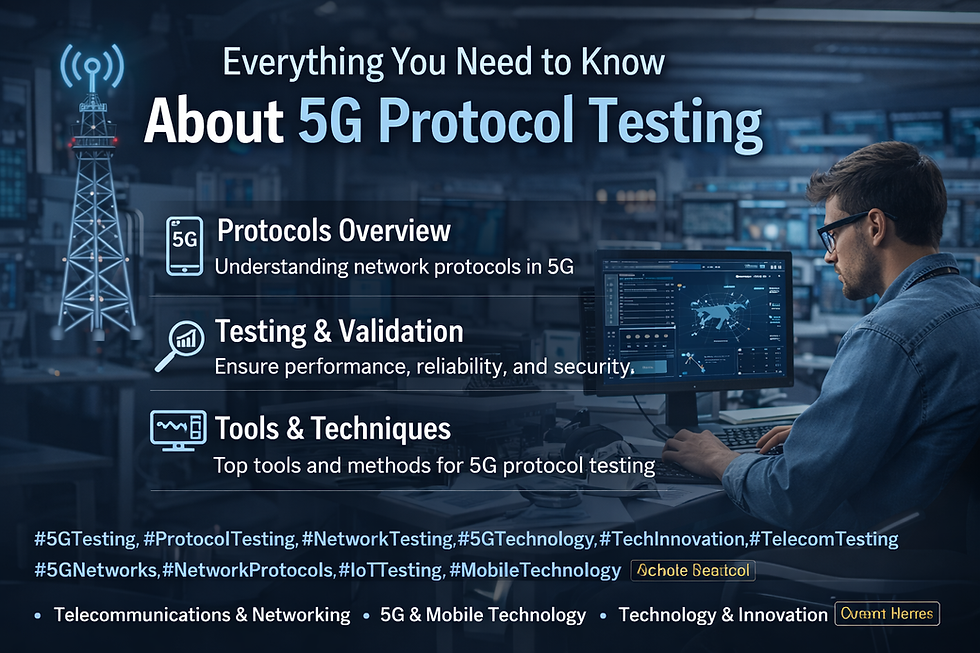The Integration of 5G Telco Cloud in Smart Homes in 2024
- Sameer Krishn
- Jun 24, 2024
- 5 min read
Updated: Jun 28, 2024

Introduction
The advent of 5G Telco Cloud technology marks a significant leap forward in telecommunications and cloud computing. This fusion not only enhances mobile connectivity and data processing but also revolutionizes various sectors, including smart home technology. As we move towards a more connected world, understanding how 5G Telco Cloud impacts smart homes is crucial for leveraging its full potential. This blog delves into the profound effects of 5G Telco Cloud on smart homes, exploring its benefits, challenges, and future trends.
Table of Contents
Understanding 5G Telco Cloud
Enhancements in Smart Home Connectivity
Improved Device Integration and Interoperability
Enhanced Security and Privacy Measures
Real-Time Data Processing and Analytics
Challenges in Integrating 5G Telco Cloud
Future Trends and Predictions
Conclusion
Understanding 5G Telco Cloud
Definition and Overview
5G Telco Cloud combines the high-speed, low-latency capabilities of 5G networks with the flexibility and scalability of cloud computing. This integration allows for efficient data management, seamless connectivity, and the ability to handle large volumes of data in real-time. By leveraging both 5G and cloud technologies, the Telco Cloud creates a robust infrastructure that supports various applications, including those in smart home ecosystems.
Importance for Smart Homes
In the context of smart homes, 5G Telco Cloud provides the backbone for a fully connected and automated living environment. It ensures that all smart devices within a home can communicate effectively, providing homeowners with enhanced control, security, and efficiency. This technological synergy is pivotal for the development of smart homes that can adapt to the needs of their inhabitants in real-time.
Enhancements in Smart Home Connectivity
Seamless Device Communication
The integration of 5G Telco Cloud in smart homes significantly improves the communication between various smart devices. With 5G’s high-speed and low-latency capabilities, devices such as smart thermostats, security cameras, and home assistants can exchange data instantaneously. This seamless communication ensures that all devices work in harmony, providing a cohesive smart home experience.
Enhanced Remote Access
One of the standout features of smart homes is the ability to control and monitor home systems remotely. 5G Telco Cloud enhances this capability by providing robust and reliable connectivity. Homeowners can access and manage their smart home devices from anywhere in the world, ensuring that their homes are secure and energy-efficient even when they are away.
Increased Network Capacity
Smart homes often consist of numerous devices connected to a single network. 5G Telco Cloud increases network capacity, allowing more devices to connect without compromising performance. This is particularly beneficial as the number of smart home devices continues to grow, requiring more robust network solutions to maintain optimal functionality.
Improved Device Integration and Interoperability
Standardization of Protocols
A major challenge in smart home technology has been the lack of standardization across devices from different manufacturers. 5G Telco Cloud helps address this issue by supporting standardized communication protocols. This ensures that devices from various brands can integrate and operate seamlessly within the same smart home ecosystem.
Simplified Setup and Maintenance
Setting up and maintaining smart home devices can be complex and time-consuming. The advanced capabilities of 5G Telco Cloud simplify these processes by automating many setup tasks and providing easy maintenance solutions. For example, software updates and device configurations can be managed remotely, reducing the need for technical intervention.
Enhanced User Experience
With improved integration and interoperability, the overall user experience in smart homes is significantly enhanced. Users can enjoy a more intuitive and cohesive interaction with their smart home systems. Whether it’s adjusting the lighting, controlling the climate, or monitoring security, the unified operation of smart devices provides a seamless and enjoyable user experience.
Enhanced Security and Privacy Measures
Advanced Encryption Techniques
Security is a paramount concern in smart homes, where numerous devices are connected and potentially vulnerable to cyber-attacks. 5G Telco Cloud incorporates advanced encryption techniques to protect data transmitted between devices. This ensures that sensitive information, such as security camera footage or personal data, remains secure from unauthorized access.
Robust Authentication Protocols
In addition to encryption, robust authentication protocols are crucial for maintaining the integrity of smart home systems. 5G Telco Cloud supports multi-factor authentication and other advanced security measures to verify the identity of users and devices. This minimizes the risk of unauthorized access and enhances the overall security posture of smart homes.
Enhanced Data Privacy
Data privacy is a critical issue in the digital age, especially in smart homes where personal information is constantly being collected and processed. 5G Telco Cloud enables enhanced data privacy measures, such as anonymization and secure data storage, ensuring that personal data is handled responsibly and transparently.
Real-Time Data Processing and Analytics
Immediate Response Capabilities
The real-time data processing capabilities of 5G Telco Cloud allow smart home systems to respond immediately to various inputs and conditions. For example, security systems can instantly alert homeowners to potential threats, and smart thermostats can adjust settings based on real-time occupancy data. This immediacy enhances the functionality and responsiveness of smart home systems.
Predictive Maintenance
Predictive maintenance is another significant benefit of real-time data analytics. By continuously monitoring the performance of smart home devices, 5G Telco Cloud can predict potential failures and maintenance needs before they occur. This proactive approach minimizes downtime and extends the lifespan of smart home devices.
Enhanced Personalization
Real-time data analytics also enable enhanced personalization in smart homes. By analyzing user behavior and preferences, smart home systems can tailor their operations to individual needs. For example, lighting and climate control systems can adjust settings based on the time of day and the user’s habits, creating a more comfortable and personalized living environment.
Challenges in Integrating 5G Telco Cloud
Infrastructure Costs
Integrating 5G Telco Cloud into smart homes requires significant infrastructure investments. The deployment of 5G networks and the necessary cloud infrastructure can be costly, potentially limiting its adoption to more affluent households and regions.
Technical Complexity
The technical complexity of integrating 5G Telco Cloud into existing smart home systems can be a barrier. Ensuring compatibility and seamless operation between new and existing devices requires specialized knowledge and expertise, which may not be readily available to all homeowners.
Security Concerns
While 5G Telco Cloud offers advanced security measures, it also introduces new security challenges. The increased connectivity and data flow in smart homes can create additional attack vectors for cybercriminals. Ensuring robust security measures are in place and regularly updated is crucial for mitigating these risks.
Future Trends and Predictions
Expansion of IoT Ecosystems
The integration of 5G Telco Cloud is expected to drive the expansion of IoT ecosystems within smart homes. More devices will become interconnected, providing even greater functionality and convenience for homeowners. This trend will continue to evolve, leading to more sophisticated and comprehensive smart home solutions.
Development of AI and Machine Learning
Artificial intelligence (AI) and machine learning (ML) will play a significant role in the future of smart homes. The advanced data processing capabilities of 5G Telco Cloud will enable AI and ML applications to become more prevalent, providing smarter and more intuitive home automation systems.
Enhanced Sustainability
Sustainability will be a key focus in the development of smart homes. The efficiency and real-time data analytics provided by 5G Telco Cloud can help reduce energy consumption and optimize resource usage. This will contribute to the development of more sustainable and environmentally friendly smart home solutions.
Conclusion
The integration of 5G Telco Cloud in smart homes is set to revolutionize the way we live, offering enhanced connectivity, improved device integration, and advanced security measures. As we move into 2024 and beyond, the continued evolution of these technologies will unlock new possibilities for smart home innovation, making our homes more connected, efficient, and responsive to our needs.
For those looking to stay ahead in this dynamic field, Apeksha Telecom offers comprehensive training programs with 100% placement assistance. Our courses are designed to equip students with the skills and knowledge needed to thrive in the rapidly evolving world of 5G and Telco Cloud.
Internal URLs:
Apeksha Telecom's training programs: https://www.apekshatelecom.com/training
Apeksha Telecom's placement assistance: https://www.apekshatelecom.com/placement-assistance
External URLs:
Telecom Gurukul: https://www.telecomgurukul.com
Reference URLs:
"The Integration of 5G Telco Cloud in Smart Homes" - Apeksha Telecom: https://www.telecomgurukul.com/post/the-integration-of-5g-telco-cloud-in-smart-homes




Comments